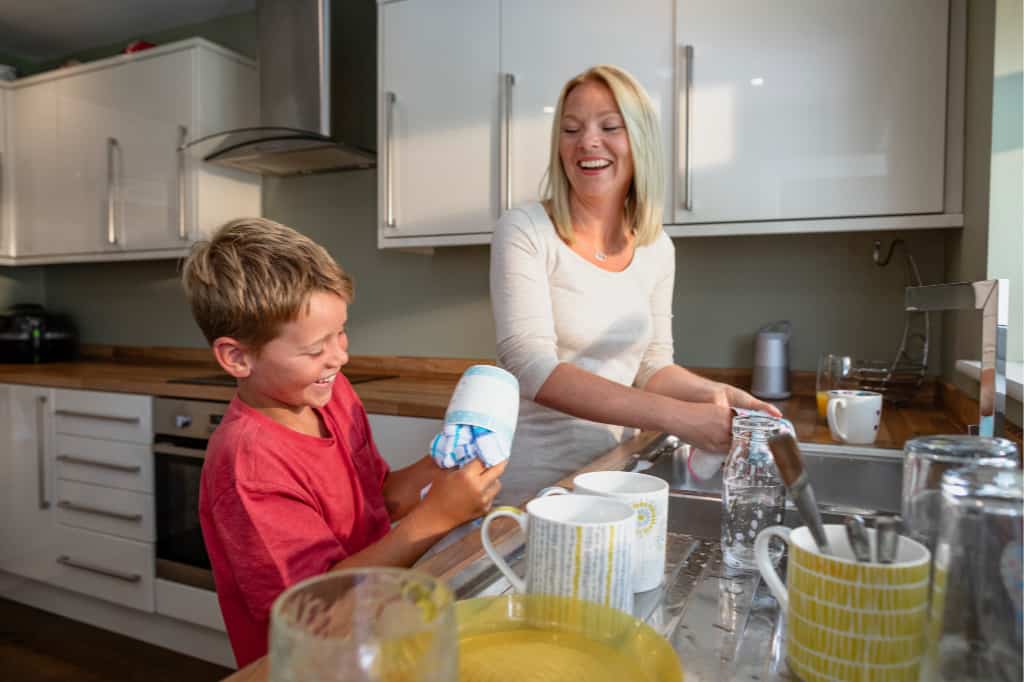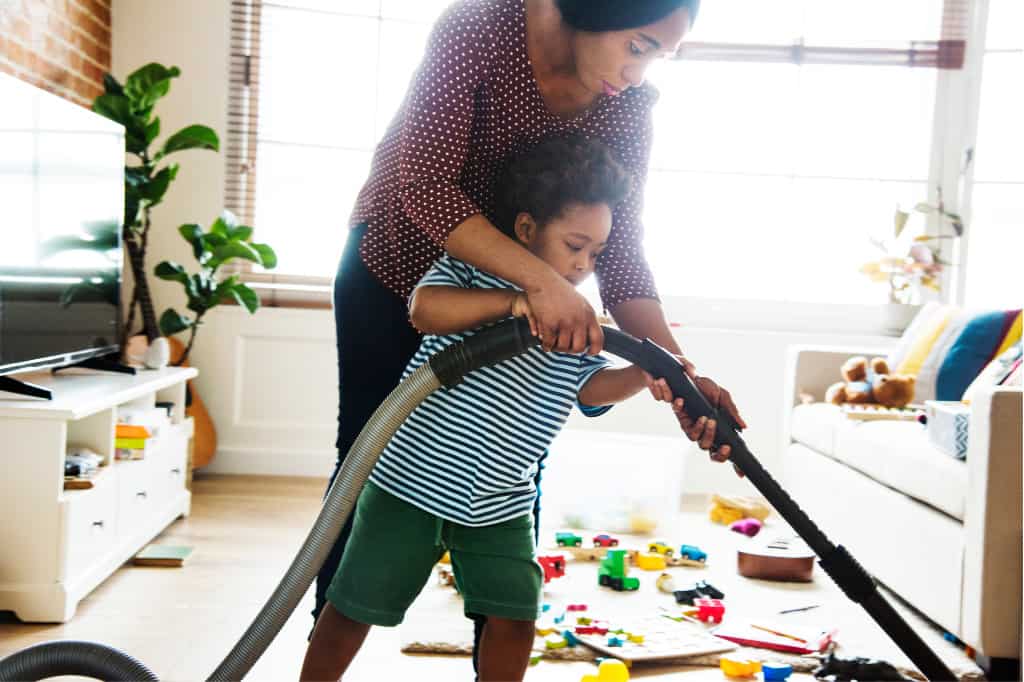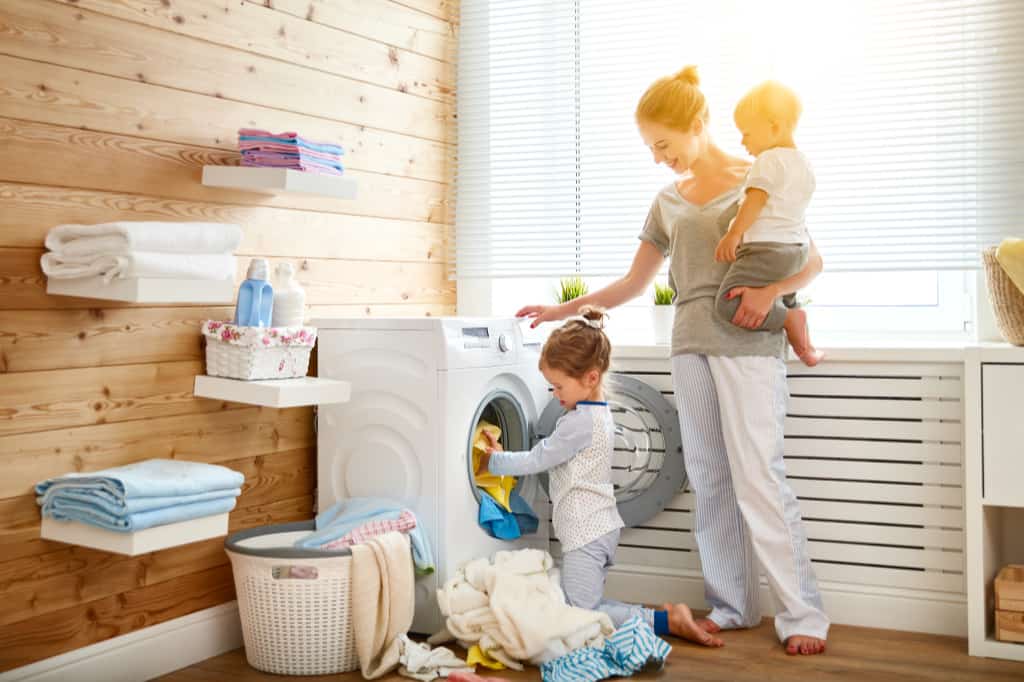Teaching kids to do chores or to help with household routines is a difficult, yet rewarding task. But how do you get kids to do chores without needing to nag, yell at them, or bribe them? Most advice on chores that I found online involved using reward systems such as prizes, treats, or allowance. Many sources also advised using chore charts or sticker charts. And although I understood the advice and know it works for many parents, it didn’t seem right for my family.
Another thing I had to let go of was my reluctance to let my daughter help me with certain chores. It’s so much easier for me to have her play or watch a show while I cook or clean. Household tasks usually take so much longer when I let my daughter “help” me. And they typically aren’t done to my satisfaction when I allow her to do a chore herself.
But after diving into the topic of chores further by reading several articles and listening to a few podcasts about how to get kids to do chores, my viewpoint on this subject changed and I realized there is so much more to involving your child in household tasks.
How can you get your kids to help clean the house and do household chores without needing to bribe them, reward them, nag or yell at them? The answer may surprise you.
Table of Contents
How to Get Kids to Do Chores: Start Early
The earlier you start, the better. But if your child is already 8 years or older, it’s not too late. Start by letting your child participate in household tasks whenever possible. If your child is a toddler, they are most likely already eager to help. Encourage them to work alongside you. Although it will take more time and will likely cause bigger messes, think of it as an investment. Your child will gradually be learning these skills.
Check out this interesting article on NPR about how to get kids to do chores without resenting it.
The article talks about kids from Mexican cultures that are intrinsically motivated to help. They often did chores without being asked and without expecting to be rewarded by toys, stickers, or an allowance. The children see themselves as partners with their parents and enjoy helping their parents out.
What is their secret? Why are their kids so helpful? They started early by allowing their toddlers to help them. Most Western mom’s have their children play when they do housework because it allows them to get it done faster. But the mom’s with indigenous heritage in Mexico invite their children to help even if it takes longer or causes messes because that is how they learn. They view it as an investment. By the time these children are 6-8 years old, they are doing many household chores on their own.
If you give young children a chance to help around the house… you might be surprised by what they can learn.
Adriana Zehbrauskas

Teach Children How to Be Tidy
Teach your child routines and processes to clean up after themselves and to be tidy. Children are naturally messy. Since tidiness doesn’t come naturally to kids, they need to be taught how to stay organized and how to avoid making big messes.
Teaching your child habits such as having only one toy out at a time, or putting their dirty clothes away instead of throwing them on the floor, will help your child learn to be tidy.
Other ideas of good habits to teach include:
- leaning over their plate while they eat to avoid a messy table and floor
- rinsing their plate and putting it in the dishwasher
- one-touch rule- put items away in the correct space the first time
- having a dedicated space for all of their things
- label baskets/organizers so kids can easily put things where they go
- taking shoes off before coming in the house
- throw trash in the trash bin instead of the floor
- schedule regular 5-minute speed cleaning sessions
- teach how to declutter their possessions
- follow the one in one out rule for new clothes or new toys
- making their bed when they wake up
- pick up/clean up as you go
These habits will not only help your child learn to be tidy; they will also drastically cut down on the amount of cleaning you and your child will have to do.
Your Mindset on Cleaning is VERY Important!
Your kids learn a lot from just watching what you do and listening to what you say. If you have a negative mindset about cleaning, they will likely follow suit. Complaining about cleaning or tidying up will teach your child to have a bad attitude about cleaning.
Instead of complaining, focus on making positive comments like, “It’s so much easier to cook when the kitchen is clean.” Or “I love it when you help me clean. It goes so much faster when everyone works together.” Or “Doesn’t the house look so nice when we clean it?”
It’s also important that you lead by example. If you want your kids to rinse their dishes after they eat and put them in the dishwasher, you need to make sure you do it too. If you want your kids to make their bed in the morning, then it is important that you make your bed. Your kids are watching you and learning from your actions every day.
Make Chores Fun
One of the easiest ways to teach your child how to have a positive mindset about cleaning is to make cleaning fun. You can turn on upbeat music and dance around as you clean. You can turn the cleaning task into a fun game or competition such as cleaning races or beat the timer. I have another post with 21 fun cleaning games. Check it out for more ideas on activities you can do to make cleaning fun for your kids.

Your Job as a Parent is To Teach Your Child How to Be an Independent Adult
I had never thought of this before, but it makes perfect sense. You have 18 years to teach your child everything they need to know to take care of themselves, to take care of a home, and to be an independent responsible adult.
Many young adults struggle with negative attitudes towards work and they struggle building habits of their own because they were not taught these habits as children.
This was a huge mindset shift for me, and it immediately made me rethink how I approached chores with my daughter.
Check out this podcast for more information about raising kids to be independent adults.
Family Jobs Vs Chores
When I started writing this post, I fully intended on providing resources for chore charts, but after coming across Donna Goff’s view on chores on a few podcasts, I was convinced that chore charts aren’t the way to go.
Instead of using chore charts, focus on training your children in the routines and habits of family jobs such as preparing and cleaning up meals, doing laundry, vacuuming, cleaning bathrooms, etc. You should train your children by having them work alongside you to perform these tasks, not on their own. Children love working alongside their family members and working together towards a common goal.
Concentrate on making cleaning a routine part of normal life and not a chore.
Why You Should Consider Throwing Away Your Chore Chart
I have never used a chore chart with my daughter, but I was going to start. All the chore charts on Pinterest look so nice and it seems like everyone uses chore charts now.
But when I thought back to the chores I did as a child it never involved a chore chart. In fact, we didn’t even call them chores. It usually involved our whole family working together to clean the house on Saturday Mornings. I remember my sister and I helping my mom cook supper and helping clean up afterward. We would also help my mom fold laundry as we watched TV.
I remember being highly motivated to surprise my mom by having all the laundry done before she came upstairs or having the whole house cleaned before she got home from work. But we didn’t get an allowance for “chores”. And when we did get “rewarded,” it always involved doing something special as a family.
Why should you ditch your chore chart?
- Chore charts teach procrastination as kids tend to be able to choose when they will finish the chores on the chart and will often put it off to the last minute.
- Chore charts also teach kids that they only need to help with the chores that are on the chart and most will not willingly help with the chores assigned to their siblings or other household tasks that come up.
- Your child will begin associating doing work with a certain reward (most chore charts are tied to reward systems) and they will be less willing to do the chore if they are no longer motivated by the reward.
- Chore charts also divide the work so everyone is doing work on their own instead of working together towards a common goal. With chore charts, there is no sense of family community.
- Chore charts often only work short term and need to be replaced with a new system frequently to continue motivating children.

You Need to Train Your Child How to Do the Chores
If you tell your child to clean their room, they likely won’t know where to begin. Children aren’t born knowing how to clean. They also won’t naturally know how to do household chores properly. You need to train them.
1. Start by setting up your own cleaning routines, cleaning habits, and a cleaning schedule.
If you don’t have clear routines and habits for yourself, you will not be able to successfully train your child to maintain cleaning routines and habits.
2. Demonstrate how you perform general tasks/routines as your child works alongside you.
Focus on the important tasks that are necessary for running your household such as laundry, preparing meals, cleaning up after dinner, cleaning bathrooms, vacuuming, dusting, mopping, working in the yard, etc.
Show your children exactly how you do the particular cleaning tasks. Show them the exact routines you follow. You are training your children in developing the habits of the routine and self-discipline. Your child will likely continue in this step until around the age of 8.
Don’t rush this step! When your child continues working alongside you, they will learn to work efficiently, and they will learn what quality work looks like. They will learn initiative, impulse control, and will learn to be self-motivated.
3. As your child begins to develop strong cleaning habits, they will be ready to move on to helping with deep cleaning tasks that are done less often.
For example cleaning out the refrigerator, washing windows, decluttering storage areas etc. After a year or two, your child will be able to run any routine in your home.
4. Around the age of 10-12, slowly start letting your child do the routines/tasks on their own and help them as needed.
5. Once they demonstrate that they can do the chore correctly on their own, then you can put them in charge of one system/routine at a time.
Depending on the child, this process can take a long time, but don’t skip the training process. It is vitally important.

Make it More About Learning and Less About Chores
Instead of just telling your child what chore you are going to teach them next, show them a list of everything they will need to learn how to do that year. Make it clear that the items on the list are all things they will need to learn this year to prepare them for when they are an adult. Check off everything they already know how to do and allow them to choose what they want to work on next. This will allow kids to take ownership of learning how to do different household tasks.
Manage Your Expectations
When you begin to introduce new skills and chores to your child, it’s important to manage your expectations. Unrealistic expectations will just cause you stress. It’s about the process, not the product. Focus on your child’s effort and not the end result. The goal is to get your child in the habit of helping and to let them practice doing household tasks.
Your child will not be able to perfectly perform the task right away. And although it is tempting to do the task for them or redo the task when you aren’t satisfied with your child’s work, avoid doing this.
Redoing your child’s work will indicate that what they did wasn’t good enough and will discourage them from wanted to learn how to do chores. If you frequently redo their work, they will just begin to expect you to do it for them.
Be patient and allow your child to learn at their own pace.

Give Chores That Are Age Appropriate
Give your child tasks that are appropriate for their age and ability. Keep it simple. Even if the task is small, if your child is making a real contribution to the chore, like helping you move things when you are vacuuming, then they will feel a sense of pride and accomplishment that will help them be intrinsically motivated later.
Break down larger tasks into manageable steps. This will help new tasks seem less overwhelming.
There are several lists of age appropriate chores online. You can find my list of age appropriate chores here along with links to several others. You can put the ideas from these lists together to form your own list that will work for your children.
Give Recognition Not Rewards
Give praise to your children for being helpful and show how proud you are of the new skills they are learning. Recognize the work your child did and how independent they are becoming. Point out the natural rewards that come from doing chores like having a clean kitchen to cook in or having more space to play.
But be careful with giving rewards and allowance for doing chores. These types of rewards work short term, but they often don’t work as a long-term solution. These systems only work as long as the reward is worth it to your child. When you stop giving rewards, they stop willingly helping. Its best for kids to be intrinsically motivated. Intrinsic motivation is long-lasting.
You shouldn’t reward children for doing basic household responsibilities. They should contribute to the basic household tasks and routines because it is expected as part of family household maintenance, not to get a reward.
If you do want to reward them with something more tangible, try doing a whole family reward. It could be something simple like a family movie night or going on a small day trip.
Give Natural Consequences When Kids Don’t Do Chores
When chores become about helping the family and keeping the household running smoothly, consequences will naturally occur when kids don’t do their chores. JoAnn from No Guilt Mom gives an example of natural consequences when her kids don’t empty the dishwasher in her post titled “You Can Stop Rewarding Kids For Chores.”
She said possible consequences could be that her kids will need to hand wash dishes for dinner. Or that dinner will take longer to make because there won’t be clean dishes. JoAnn says that these types of consequences help your child “internalize responsibility, develop empathy for others, and discover the real results of their actions.”

Where Should You Begin?
No matter how old your child is, it is never too late to get started in training your child to do household tasks. And if your child is young, don’t underestimate what they can do. Take advantage of your youngsters’ excitement for helping and learning new things.
If you are currently using a chore chart and want to stop, sit down with your kids and explain that you are going to begin doing a new system called family work. Explain why the change is necessary and clearly tell them what your expectations will be and what family work will look like. Your children will likely enjoy working alongside you and learning new life skills as opposed to doing chores by themselves.
When you get started, have realistic expectations and remember the training process is long, but worth it. I think you will find that this approach to getting kids to help around the house is much less stressful and that your children will be much better prepared for adulthood.
PIN FOR LATER:


Leave a Reply